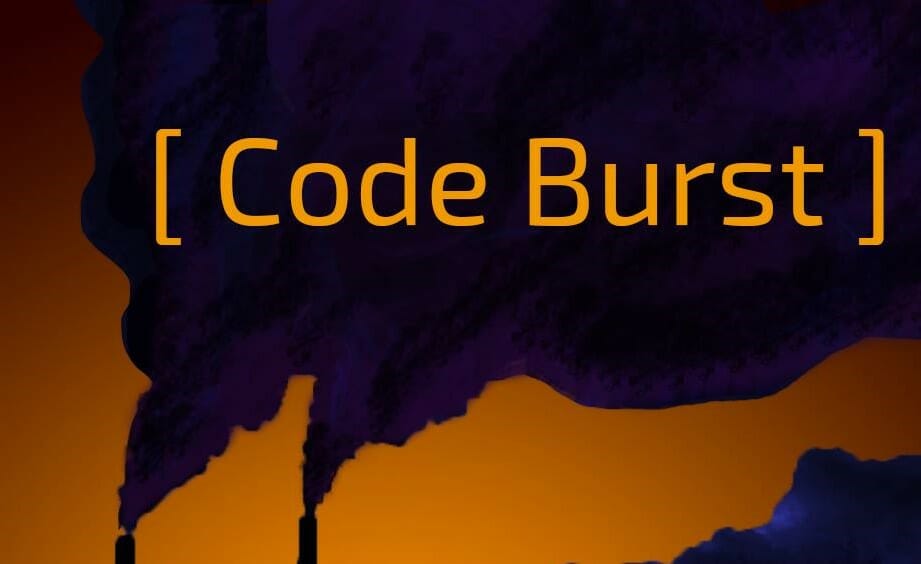
Articles
Editor’s Picks
Code Burst Episode 3: Taken for Federal Granted
By Henry Kronk
March 20, 2018
In mining, there’s something known as rock burst. It happens in deep mines and tunnels around the world. Deep drilling causes the rock to shift and buckle. Shards can unexpectedly burst from the tunnel walls, injuring or killing miners.
Code Burst is a story about a violent, unexpected shift in the structure of the global economy. It focuses on a coding bootcamp called Mined Minds and involves the growing skills gap, the tech industry, the increasing obsolescence of higher education, and one married couple who either tried to make a difference, or tried to make a buck. This is a story about trust.
In previous episodes, Code Burst introduced the coding bootcamp Mined Minds, discussed how its media coverage has defied accuracy, and went over how the initiative came about.
Since people have begun to criticize Mined Minds, the main point has been that they promise the moon and fail to deliver. Certainly that is cause for concern on its own. But that argument has often been compounded by another point: Mined Minds receives state and federal dollars. That changes things. If it’s true, that means that the coding bootcamp isn’t just affecting their students; they’re taking a toll on taxpayers.
Last week, I discussed how Mined Minds got started. This week, I’m going to quickly bring the story up to the present and discuss their expansion into West Virginia. From there, I’m going to spend the rest of the episode on how Mined Minds makes money on their non-profit end.
The Word Gets Out
In 2016, Mined Minds began to receive national coverage from the likes of CNN, PBS, and WNYC. People outside of Pennsylvania heard about them. One of those people was West Virginia senator Joe Manchin. He invited Mined Minds to a local job fair and, following enthusiasm from learners, asked Mined Minds to set up in his state . As far as I can tell, his office took strides to facilitate this process.
CBS reporter Weija Jiang reports, “Manchin helped Mined Minds establish headquarters near West Virginia’s capital using money from federal grants.”
According to Max Garland who reports for the Charleston Gazette-Mail: “The Kanawha County Commission funded the development of Mined Minds’ Clendenin office, where West Virginia graduates work as apprentices.”
“The commission voted in February to spend up to $40,000 on the office build-out in addition to $900 a month for rent for two years, the Gazette-Mail previously reported.”
“Mined Minds has also been teaching software development classes at the West Virginia National Guard’s Mountaineer ChalleNGe Academy. The academy purchased two 120-hour classes from Mined Minds costing $24,800 each, documents obtained by the Gazette-Mail show.”
“In a statement, Maj. Gen. James A. Hoyer, adjutant general for the West Virginia National Guard, said the WVNG’s relationship with Mined Minds “has been productive and successful and that it does not forsee any changes” in that relationship despite the lawsuit.”
“Mined Minds has also had apprenticeship pay reimbursed through the Charleston-based Human Resource Development Foundation or the HRDF, a nonprofit workforce government agency of the West Virginia AFL-CIO.”
“The HRDF reimbursed the pay with a portion of a National Dislocated Worker Grant it received from WorkForce West Virginia, said HRDF deputy director Amanda Filippelli. The grant was for HRDF’s “Job Driven On-the-Job Training Program,” which reimburses employers to hire and train dislocated workers.”
“There were six Mined Minds employees who had a portion of their wages reimbursed through the program, according to Filipelli. She said she didn’t know the total reimbursed to Mined Minds, but that it could’ve been up to 90 percent of those employees’ wages.”
“Filipelli said it seems like Mined Minds has good intentions, even with recent issues.”
“’I don’t know enough about the situation, but it sounds like it’s unfortunate,’ Filipelli said of Mined Minds. ‘If some [participants] are back to job-seeking status, we have other programs we could help them with. We hate to hear when anyone feels they are treated unfairly.'”
I’m not exactly sure how many institutions partnered with Mined Minds in West Virginia, but it seems like the number’s at over a half-dozen at this point. They have their own spaces in Clendenin and Beckley, W.V., and they’ve offered their bootcamp to learners at the National Guard’s Mountaineer Challenge Academy, Chapman Regional High School, Bridge Valley Community College, and elsewhere. It’s very possible there is overlap there. When Mined Minds partnered with CCAC in Pennsylvania, for example, students joined their regular class at their Waynesburgh Location.
In other words, they’ve seen significantly greater success in West Virginia, at least in terms of number of institutions willing to partner with them. But it’s unclear how many they have trained so far. Laucher has claimed that they can train 200 learners a year, but it seems like, after over two years in operation, they’ve barely trained 100 people, if that.
“Receiving” vs. “Subcontracting”
I may as well transition to funding, because I’ve basically already been talking about it the entire show.
While a lot has changed in the coverage of Mined Minds, one talking point has remained pretty much consistent the entire time: the co-founders Amanda Laucher and Jonathan Graham offer their program for free. They haven’t received any federal grants, but they have partnered with organizations that have received federal grants.
Or in the words of Amanda Laucher, “This was 100% funded by us. It was something that we did in our spare time to start out. But when we realized how big the problem actually is, we both quit our jobs to do this. It’s all our time and our money.”
When I began this reporting, I had no idea what that meant. Like, did organizations allow them to use their space? Did they divert some volunteer hours towards their cause? Did they help them advertise? Did they hire them as consultants? Did they pay them directly?
If we trust the reporting from the Charleston Post-Gazette, then several of those possibilities are confirmed as true. As they report, Mined Minds received access to a space from a local commission, the National Guard paid them to educate two learners (and that, by the way, was at a cost much higher than most coding bootcamps), and another job development agency supplemented their interns’ pay by as much as 90%.
Based on the detail of the Post-Gazette’s report, they seem more trustworthy than some. They claim they have documents backing up their figures. But I’m still going to reserve my trust of their story. For this next segment, I’m going to rely purely on what I have overturned myself.
The most notorious grant attributed to Mined Minds so far has come from the Appalachian Regional Commission. The ARC is a federal body, and they allocate federal funding to achieve a number of goals in the Appalachian region.
In June of 2017, they announced their new round of what are known as Power Grants. According to an ARC statement:
$1,489,945 ARC grant to Washington Greene County Job Training Agency, Inc., in Washington, PA, for the Appalachian Region Code (ARCODE) Initiative. The ARCODE Initiative will teach high-demand skills in software engineering and development to displaced workers from the coal sector in southwest Pennsylvania and West Virginia. It harnesses and combines the software training expertise of Mined Minds, a proven software development training organization, and CentralApp, an international software solutions developer. The two will work together to provide courses and certifications needed to qualify for high-demand technology jobs, enabling participants to work locally for companies that can be located anywhere in the world. Mined Minds will provide a supply of certified tech talent that program partners and others will be able to hire locally or contract for short-term, labor-intensive projects. CentralApp trainees who obtain certifications will have access to CentralApp Talent Exchange and will Page 4 / June 2017 obtain work from its customer base of thousands of active Salesforce customers, systems integrators, and consultancies. The project will train and place 71 workers in computer tech jobs at seven or more companies.
From the beginning, Mined Minds says they haven’t received any federal grants. Amanda Laucher has reiterated this again and again. Early on in my reporting, I managed to get Laucher and Graham on the phone.
Henry Kronk: “One thing I still don’t understand is, you guys say you’ve funded this all on your own, but haven’t you received a substantial amount of federal grants? I’ve heard at least of the ARC giving you guys $750,000 [the figure is actually about $700,000].”
Amanda Laucher: “It’s such a surprise to hear people say that. We’ve never received a penny from anybody. The ARC gave a grant to Washington Greene County Workforce Development [their name is Washington Greene County Job Training Agency] and we’re a subcontracter to them where they provide us an hourly rate to do the training.”
Are you beginning to see why these guys drive me crazy? In one sentence, they say they haven’t received any money from anything. And in the next they turn around and say they’re getting paid from a federal grant provided to a local workforce development board. And if that’s where you thought the confusion ended, you’d be wrong.
HK: “[I read that] at one point you guys were charging money for people to attend the bootcamp but for most people, that cost was completely subsidized by the workforce development board. Is that also a misunderstanding?”
AL: “We’ve never charged anybody money.”
HK: “I understand you weren’t charging people money, but a Pittsburgh publication reported that the cost of attending was subsidized by something called PA CareerLink.”
AL: “You’d have to contact them. We do do subcontract work for them [CareerLink] but that’s under an hourly contract. We’ve never had a charge for anyone in Pennsylvania.”
Jonathan Graham: “With CareerLink, they pay the Community College [of Allegheny County], who then contracted us as trainers.”
AL: “Ahh that must have been it. That money never went to us again. Jonathan was a W-2 employee for a local community college and they received that money.”
Since I began reporting this story, I have been trying to track down that ARC grant. The only problem is, no one wanted to talk to me about it. The ARC itself could only say that they provided it to the Washington Greene County Workforce Development Board. I got in touch with several people there, and I was directed to seek out their president, Ami Gatts. It took me a few weeks of leaving messages before I got her on the phone. I’ll play that interview later.
Meanwhile, After my only conversation with Laucher and Graham on the phone, I thought we were on decent terms with one another. But when I started discussing their operations with their employees and clients, they changed their minds. In passing, I asked everyone if they knew anything about the ARC grant, just in case.
On February 7th, I received an email written by either Amanda or Jonathan. They write:
“We would prefer that you don’t bother our employees and contractors with questions you can easily ask ARC about. A 30 second phone call will easily destroy any notion that we received a pile of money from the federal government.”
If only that were true. Unfortunately, to faithfully report even a very inconsequential piece of information, it takes much more than a 30 second phone call.
The back and forth between me and Mined Minds got ugly. When I made my scrutiny clear, they lashed out defensively, and wrote insults.
Some Clarity at Long Last
And then, after trying to get in touch for weeks, Ami Gatts gave me a call.
Ami Gatts: “Well I can’t speak to what [Laucher and Graham] said. What we know is that they have invoiced us for about $160,000 towards the grant. I also know that they have come up with about $180,000 of in-kind match against the grant too. Again, I can’t speak to what [they have] said, but they have invoiced us for this grant. Their total contract is $702,000, but they’ve only invoiced us for $160,000.”
HK: “So pretty much how it works is you connect them with learners, they train them, and then they’re reimbursed for what a course like this would cost otherwise?”
AG: “It’s kind of hard to explain. They sent in a proposal for this kind of training.”
HK: “Are you familiar with the reports that have come and the lawsuit in West Virginia that claims that these guys aren’t really doing what they’re saying?”
AG: “Well we have seen some articles come out but, we don’t have any information … I wouldn’t know about that. I don’t have any details about it, no one has come to us for information. I know probably as much as you do.”
When Laucher said they had subcontracted with the Washington Greene County Job Training Agency, I thought they were performing consulting work for them. So yes, Laucher and Graham have spent a good deal of their own money on Mined Minds, but they also received funds from federal grants. Graham became a W-2 employee of the Community College of Allegheny County. State and local governments in West Virginia helped them set up shop. It turns out that the funding of Mined Minds is so piece-meal, that even the co-founders can’t keep it completely straight.
Still, that doesn’t explain why Laucher is so keen to hammer home the fact that they have completely self-funded from the beginning.
Another thing that Laucher told me again and again is that this could be easily cleared up. All of the grants and funding provided to Mined Minds are matters of public record. Anyone could look up their 990 tax forms. Any 501(c) non-profit in the U.S. has to disclose their funding in these forms.
The only problem is that their latest 990 was for 2016, which was only when Mined Minds got started. There wasn’t much to learn from it. They reported gross receipts of just over $10,000 with assets of around $4,000.
The Most Recent 990 from Mined Minds
But then, Laucher and Graham sent me their 990 for 2017 just last week.
It lists the following:
$383,739 dollars in program service revenue. They do not itemize this in their return, and the document doesn’t show where that money came from. The only explanation I can find is that it came from contracts like that with the Washington Greene County Job Training Agency, or with the West Virginia National Guard, etc. That makes for a gross revenue of $390,021.
Of that, none went to ‘current officers, directors, trustees, and key employees.’ Laucher and Graham didn’t take any cut of their income from the non-profit.
At this point, I think I can debunk two things. First, Mined Minds definitely receives taxpayer dollars. None of it was a check mailed from Washington, DC, but it did come from the people of at least West Virginia, probably Pennsylvania, and definitely in part from federal taxes paid by Americans throughout the U.S.
Second, and more importantly: according to the 990, Laucher and Graham aren’t getting any of that money. They’re not cutting themselves a paycheck from their non-profit operations.
Their expenses total $368,253, which is just over $20,000 shy of their gross revenue. Of this, $164,027 went to employee salaries. I imagine these employees would be others teaching the coding bootcamp, but the section isn’t itemized. All I can know is that these employees aren’t trustees, directors, officers, or key employees. Besides other small items, like employee benefits and payroll taxes, the rest of their expenses went to paying their apprentices for their for-profit consultancy.
At first, I thought this was cause for concern. Sure, they could use their profits from selling their bootcamp, but it seemed questionable to use money from a federal or state grant—which was intended for education—to pay their workers on the for-profit end.
But I spoke with Ami Gatts about this and she said that Mined Minds’ structure is not uncommon. Their learners need workplace experience, after all, and the ARC is happy to foot the bill, especially if it means that successful learners will go on to start their own companies and bring business to the region.
So regarding Mined Minds’ financials, here’s the bottom line: they’re operating within the confines of the law and within the terms stipulated by the government bodies that have aided their program.
The Importance of Public Relations
But despite this, Laucher and Graham generated a toxic public persona by simply misrepresenting themselves. Their own statements compounded the negative experiences of at least a few students and led readers to believe that something suspect was going on.
The case of Mined Minds should serve as a cautionary tale. In today’s media climate, actions don’t necessarily speak louder than words. Amanda and Jonathan clearly have expertise in the tech industry. But they are total noobs when it comes to PR. And as their story illustrates, a PR failure can have serious implications. One of the reasons West Virginia lawyers cited for taking on the case was that they read the negative reports from elsewhere.
From the beginning, I’ve asked the co-founders to provide their own version of the story. At first they were interested, but after our relationship deteriorated, they changed their minds. Again and again, they either refused to sit for an interview, or simply ignored my emails. Other reporters have also spoken about how, when they questioned Mined Minds in any way, they simply ran into a wall with the co-founders. They stopped talking and skipped out on scheduled interviews.
When people bury their heads in the sand, it looks suspicious. It looks like they have something to hide.
I didn’t have much trouble getting in touch with some other people involved in this story.
“West Virginia, as you probably know, is an underserved community,” that’s Adam Taylor. He’s based out of Beckley, West Virginia and he’s representing Ty Cook, Tori Frame, and what’s probably soon to be others in the class action lawsuit filed against Mined Minds.
“I don’t want to get into the politics of it, but it’s been underserved for a very long time to the benefit of the rest of the country. You get a lot of programs around here that report to have altruistic purposes. They come in and they say they want to do this, they want to do that, and some of them do. Some of them do mean well. And some of them don’t.”
“It especially stings with a case like Mined Minds where, on a personal level and on paper, it looks very good. You read about them and you think, this is probably moving things in the right direction and in the direction we need to go. But then you start to hear reports like by KDKA in Pittsburgh or what we’re getting into down here where it appears to be not so altruistic. So I can’t speak to a pattern of these programs nationwide, but it is something that’s not terribly uncommon down here, unfortunately.”
You have been listening to Code Burst. This program is produced as a collaboration between CKUT 90.3 FM and eLearning Inside News. Evan Dent and Tamara Filyavich helped me put this episode together. Alex Johnson, Julia Isler, and Katrina Gibbs read portions of the script. All of the music played on this episode comes from Daniel Monkman who is currently playing under the name Bloom. His LP containing these tracks is forthcoming. Tune in next week, and you’ll hear all about the lawsuit filed against Mined Minds. My name is Henry Kronk, thanks for reading.









No Comments